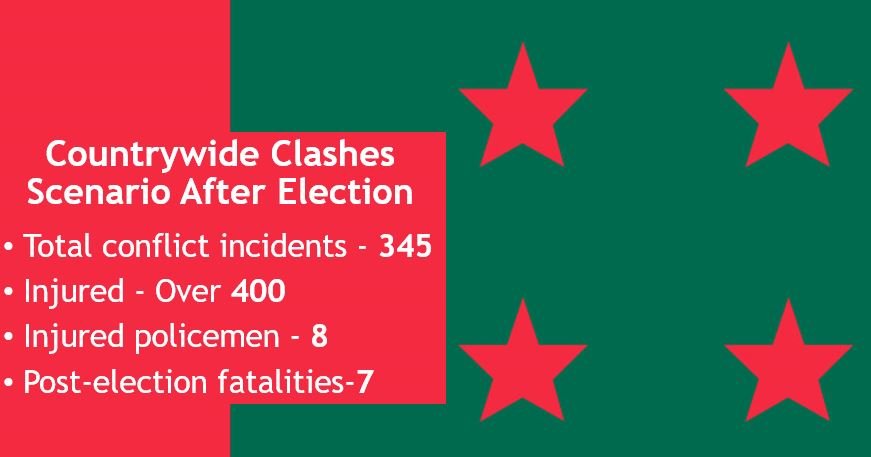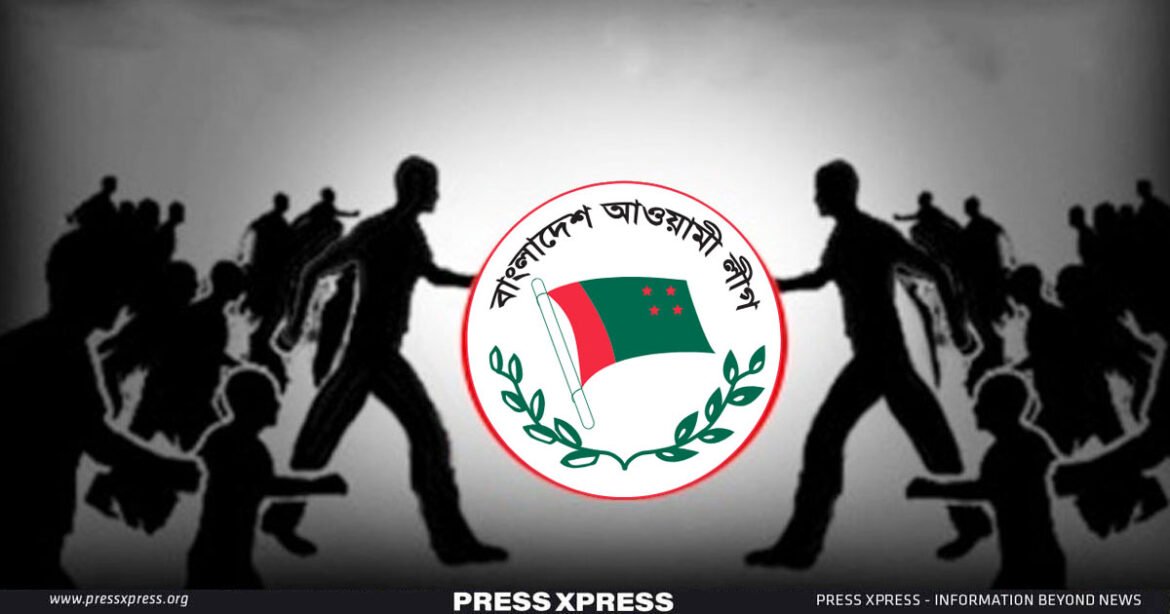The post-election 2024 scenarios among grassroots Awami League are showing a concerning trend of election-related violence, with numerous fatalities and injuries reported in the aftermath of parliamentary elections.
The evening of Sunday, February 18, 2024, marked a tragic turn of events in Mollarkul village of Mollahat upazila in Bagerhat, as a violent clash erupted between two factions of the local Awami League, namely the Kazi group and the Khaki group. Panna Molla, a 40-year-old farmer, fell victim to the confrontation, losing his life, while at least 20 others sustained injuries, including six policemen, three of whom were sub-inspectors. The skirmish, lasting approximately two hours, escalated to the exchange of gunshots, escalating tensions and resulting in casualties.
You Can Also Read: AWAMI LEAGUE CONFIRMS 48 WOMEN FOR RESERVED SEATS
The conflict stemmed from a struggle for local dominance between the opposing factions of the Awami League, highlighting underlying tensions within the party. Additional police forces were dispatched from Bagerhat to contain the violence, leading to the arrest of four individuals associated with the clash. However, this incident is not isolated, as similar clashes have plagued various districts in the past, tarnishing the image of the Awami League.
Countrywide Clashes Over Dominance In The Past
Earlier, Election-related violence resulted in seven fatalities within the first 10 days following after parliamentary elections, with a total of 345 conflict incidents reported. Over 400 individuals, including eight policemen, sustained injuries, as revealed by a government intelligence report. Human Rights Support Society (HRSS) disclosed that 15 deaths and 2,200 injuries occurred during the two months following the announcement of the election schedule until January 15. Most clashes involved Awami League factions. Specific regions, such as Jhenaidah, Munshiganj, Kalkini, Kauakuri, and Belkuchi, experienced numerous incidents, including attacks on properties.

Afsar Uddin Ahmed, President of Munshiganj Sadar Upazila Awami League, acknowledged internal conflicts within the party. Saiful Islam, a research officer at HRSS, attributed the ongoing violence to factionalism within the Awami League and the challenges faced by the police in taking action due to pressure from conflicting factions. High-ranking Awami League members expressed concern, with directives for restraint issued to Trinamool, and had planned for an extended party meeting on February 10, 2024.
A Way to Mitigation Clashes
To mitigate the clashes between the two factions of the local Awami League and restore peace within the party, several strategic steps must be taken by the leadership:
- Mediation and Dialogue: Immediate intervention by senior party officials to facilitate dialogue between the conflicting factions is crucial. This should involve a neutral mediator respected by both sides to foster understanding and reconciliation.
- Conflict Resolution Mechanism: Establishing a robust conflict resolution mechanism within the party structure to address grievances and disputes effectively. This could involve setting up a committee dedicated to resolving internal conflicts promptly and impartially.
- Leadership Accountability: Holding leaders of both factions accountable for maintaining party discipline and preventing violence. Communicating that any involvement in clashes will result in strict disciplinary actions, including expulsion from the party.
- Training and Awareness Programs: Conduct training sessions and awareness programs for party members on conflict resolution, non-violent communication, and the importance of maintaining party unity. To emphasize the adverse consequences of internal conflicts on the party’s reputation and electoral prospects.
- Community Engagement: To engage with the local community to build support for peacebuilding efforts and discourage participation in violent confrontations. To encourage community leaders to mediate and promote dialogue between the factions.
- Legal Action Against Perpetrators: To Ensure swift and impartial legal action against individuals involved in violence, regardless of their political affiliations. To demonstrate the party’s commitment to upholding the rule of law and maintaining public order.
- Reconciliation Initiatives: To initiate reconciliation initiatives between the factions, such as joint community service projects or collaborative campaigns, to foster trust and cooperation.
- Continuous Monitoring and Evaluation: To implement a system for continuous monitoring and evaluation of internal dynamics within the party to detect and address potential conflicts proactively.
By implementing these recommendations, the Awami League can mitigate clashes between factions, promote party unity, and uphold its reputation as a responsible political organization committed to peace and stability.
In conclusion, the recent fatal clash in Mollarkul village emphasizes the urgent need for the Awami League to address internal factionalism in many parts of the country. To restore political-collegial harmony, immediate steps are essential for the top leadership of the ruling party.


